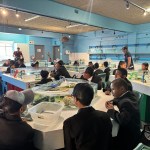Would students at master’s and doctoral levels be better off spending less time writing, and more time developing a concise and progressive set of papers? With demands on their time becoming ever more stringent, would supervisors be better placed to read such shorter, well-crafted combinations? Does anyone apart from the student ever read an entire doctoral thesis? Do multi-authored papers blur the boundaries of the attributable research, and individual contributions? Would limited lengths encourage more exact writing and better equip students for the competitive world outside of academia, where many, if not most post-graduate students end up as funding and university positions dwindle?
On the other hand, does the traditional approach to the thesis, with its carefully structured reasoning sustained over a single longer document, promote consistency and diligence, both in research and in writing? Does the traditional thesis better capture the “unfolding of the mind” that is the aim of all post-graduate degrees? Is it in some sense a profound moment of coming of age that is essential to the future endeavours of the student?
What’s more – are some fields like engineering and physics more suited to any one approach than, say economics, or psychology? Are the temperaments of some students better suited to one framework or another? And which approach best suits the needs of developing countries, where sustainability, societal benefits and equality of opportunity are essential in a relentlessly competitive global world?
Or is there value in a hybrid of these two approaches – an integrated approach that would be best suited to the 21st Century and the digital revolution that is changing our societies for ever?
At a time when a good thesis is simply not enough to secure an academic job, and when publication is increasingly difficult, most would agree that a master’s or doctoral student needs to conduct and communicate independent, original research. But can – indeed, should – the way that aim is fulfilled be changed for the better?
Once the debate is opened, the questions multiply, and answering them meaningfully is critical if higher education is to move forward relevantly. A response is required.
And the University of Johannesburg (UJ) is already responding. The university understands the implications of changing societies and the role of education in promoting and reflecting that change. That’s why, as a leader in research in Africa, UJ has embarked on a series of Cloudebates™ to discuss every aspect of the Fourth Industrial Revolution as it impacts our lives in general and the roles of universities in particular.
And because UJ’s Cloudebate is a discussion that involves everyone, if you’re a researcher, a teacher, a post-graduate student, or anyone with an interest in how we research, frame and write up the knowledge that will shape our society and our world for the future, you’re invited to join our next Cloudebate™ and participate in the conversation about academic research on Wednesday, 10 April 2019 at 18:00. Register for free at www.uj.ac.za/4IR. DM


















 Become an Insider
Become an Insider